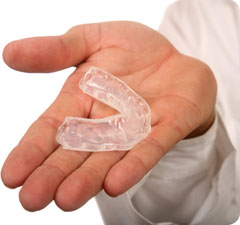Do you grind your teeth?
 Many
patients are unaware that they are grinding their teeth because it often happens
while they sleep. They may wake with a headache, toothache or a sore face. In
addition to causing discomfort, grinding can wear away or fracture tooth enamel
and may eventually loosen teeth.
Many
patients are unaware that they are grinding their teeth because it often happens
while they sleep. They may wake with a headache, toothache or a sore face. In
addition to causing discomfort, grinding can wear away or fracture tooth enamel
and may eventually loosen teeth.
Bruxism can develop at any age, and children as well as adults can have the
habit of grinding their teeth. Although the causes of bruxism are not really
known, several factors may be involved. Stressful situations, problems sleeping,
an abnormal bite, and crooked or missing teeth may responsible.
Regular dental checkups are important to detect damage in the early stages.
Your dentist can diagnose and treat irregular wear on teeth and determine the
source of facial pain that may result from bruxism.
Based on your dentist’s diagnosis, one or more treatments may be recommended.
The dentist may suggest a night guard that can be worn while sleeping.
Custom-made by the dentist from soft material to fit your teeth, the night guard
slips over the upper and lower teeth and prevents contact between them. In
addition to providing cushioning, the night guard relieves some of the pressure
of grinding and clenching, which can damage delicate jaw joints.
When everyday stress seems to be a major cause of bruxism, it may be helpful
to find ways to relax-listening to music, reading book, taking a walk or
enjoying a warm bath. Applying a warm, wet washcloth to the side of the face may
help relax muscles that have become sore from clenching. If you have difficulty
handling stress, counseling may point to effective ways for dealing with
stressful situations.
An abnormal bite, one in which teeth do not fit well together, may lead to
grinding. Treatment may involve reducing the “high spots” on one or more teeth.
For serious cases, your dentist may suggest reshaping or reconstructing the
biting surfaces with inlays or crowns.
Grinding is a common occurrence for many people at some time or another. If
you suspect that you are routinely grinding your teeth, see your dentist about
protecting your smile.